|
|
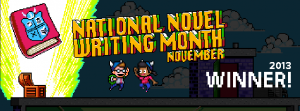
I did it!
It was really hard going, especially when I got behind.
I worked hard to catch up over the last week. At one point I was almost 8,000 words behind and I honestly thought about giving up. I didn’t fall out of love with my story this time (that’s what happened in 2011, I had an initial idea but no clue what would happen with it and that didn’t work) but I did have trouble maintaining any momentum. Writing is hard. But, instead of just giving up this time, I sat down in this chair every day after work for the last week and wrote and wrote and wrote – see the steeper curve starting on day 23.
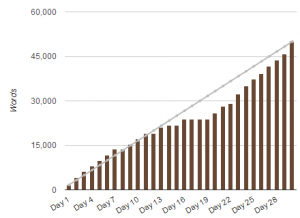
It’s a pretty bad drawer novel, but it’s done, and I can actually finish a story.
Lessons learned:
- PLOT. I really need to learn how to sort out what’s going to happen and when. I knew the beginning, middle, and end roughly, but how I got there? Challenging. I think I might next time operate within a more detailed framework that I develop before I write anything. I got lost around the mid-way point and didn’t really know what I should write next. I also didn’t really have a central conflict, which I only realized once I got going. I introduced one, but I didn’t put enough thought behind it.
- Characters need flaws. Mine were way too perfect. And the bad guys were way too evil. It’s only practice, but it’s important practice.
- Descriptions are good and I should include them.
I’m going to take some time off writing now, possibly a couple of weeks, but I feel energized. Maybe I can do this writing thing, after all. Also, I’m proud of myself for not giving up. I’m not that good at keeping myself to goals when I get stressed out or busy through methods I can’t control (namely, the day job) and the fact that I did it means that hopefully I can keep on doing it.
Back to book blogging soon, I promise!
 Giving up blogging has been an educational experience. I’ve been writing in this blog regularly for at least six years, and the last more-than-three-weeks is the longest period I’ve ever gone without writing a post. I fully intend to return to blogging because, oddly enough, I find that I miss it. I’m also craving writing something – anything – that isn’t my fledgling novel at the moment, so I thought I’d share a few observations. Giving up blogging has been an educational experience. I’ve been writing in this blog regularly for at least six years, and the last more-than-three-weeks is the longest period I’ve ever gone without writing a post. I fully intend to return to blogging because, oddly enough, I find that I miss it. I’m also craving writing something – anything – that isn’t my fledgling novel at the moment, so I thought I’d share a few observations.
The first one is that, to my actual surprise, I have been drawn immediately to longer books now that I don’t have to review anything. Lifting the pressure of writing reviews has also lifted the pressure to read things I can get through quickly. I almost instantly continued my re-read of A Song of Ice and Fire and I’ve gotten through A Storm of Swords and A Feast for Crows. I’ve been wanting to finish my re-read of these since the TV show started, especially because I haven’t actually read A Dance with Dragons, and while I’d actually read the first two a couple of months ago and started A Storm of Swords in October, this re-read in close succession has been delightful and reminded me of why I loved these books to start with. Namely, amazing characters, world-building, surprises that I’d forgotten – a world that actually feels as though it lives and breathes every time I go back to it.
I also started reading 11/22/63 by Stephen King, who is another of my favorite authors that fell by the wayside when I became more attracted to shorter books. It’s taken me ages to read this, mostly because my husband and I went to Spain for a week, but I love that I don’t feel pressure to get through it quickly. I can just enjoy reading it as it comes. I didn’t realize how much of my impatience on getting through books was because of blogging; I actually thought it was just because I’m an impatient person in general (a character flaw).
I’ve also learned a ton about what I need to do to actually write a successful novel because this attempt has felt like flailing around in mud and slowly sinking, but I think that’s a subject for another post.
Lastly, it was really nice not to have to think at all about blogging while we were on holiday. Of course, when I decided I didn’t have to, I immediately thought about how I’d write up the trip for my blog. It’s almost as though removing the pressure and the need to write a post every so often has given me back the desire to actually write posts (and that’s where this one comes in). Having a week off from work helped, too.
 Malaga Alcazaba In any case, I think I’m ready for my return to this little corner of the internet in a week’s time, or at least I feel as though I am now. Let’s hope the week of work and frantic novel-writing ahead doesn’t change that, and I’ll see you all here next Sunday.
Have you taken a break from blogging? What did you find?
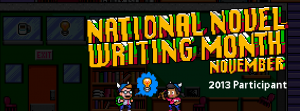
Hi folks! As the post title says, I’ve elected to give up blogging for the next month while I focus on NaNoWriMo. I haven’t successfully completed a novel since I started working, so I really want to reverse that trend. I just don’t think I can do both blogging and writing this much. I also think know I badly need a longer term break from blogging. If I write anything bloggy-oriented, it will wait until December. So, here we go with both of them, and I’ll see you all December 1st!
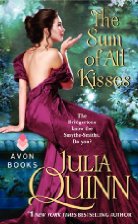 As his brutish father’s only hope for an heir, Hugh Prentice has not had an easy time of it, and when he got drunk and shot his best friend, his life got considerably worse. Now a cripple, he’s finally managed to get his father’s heavy hand away from Daniel Smythe-Smith, but has a lifetime left of loneliness to deal with. As his brutish father’s only hope for an heir, Hugh Prentice has not had an easy time of it, and when he got drunk and shot his best friend, his life got considerably worse. Now a cripple, he’s finally managed to get his father’s heavy hand away from Daniel Smythe-Smith, but has a lifetime left of loneliness to deal with.
Lady Sarah Pleinsworth’s first season was abruptly cancelled when her cousin Daniel was shot and exiled as her family went into mourning. She’s never quite forgiven Hugh for delaying her marriage prospects and making her cousins miserable; a series of disastrous encounters haven’t helped the situation, either. But when Sarah is forced into contact with Hugh at her cousin Honoria’s wedding, purely as a favor, she discovers that she actually likes him, and that his good looks don’t hurt, either.
Julia Quinn’s romances are always reliably sweet and, well, romantic. They rely much more on sparkling character interactions and adorable situations than any other author I’ve ever read; these are, for me at least, properly feel good books. And I approached this one in exactly the right frame of mind to need a pick-me-up with a romance I could get behind, without ridiculously high expectations. On this, the author delivered perfectly, and I read The Sum of All Kisses in one day, closing it with a smile.
One of the aspects I liked the most, as usual with Quinn’s romances, was in fact that interaction between the characters. Hugh and Sarah really don’t like each other at the beginning and had me wondering how they were going to believably end up together. But their dislike is based on fundamental misunderstanding and frustration due to the situation. As soon as they’re together for a longer period of time and have no choice but to talk to one another, the problems start to resolve and they realize that actually they do like one another. Those roadblocks they created were mental, and together they can overcome them quite easily.
It’s a classic situation where two people just don’t know each other enough, and make some misjudgements as a result, but then once they do know one another, things start to change. I loved the fact that they just enjoy one another’s company for a nice chunk of the book; they like each other and that’s one of the things I love about Julia Quinn’s romances. This is a perfect example of that.
The only part of the book I didn’t like were some aspects towards the end – I felt that a certain amount of drama was excessive and kind of unnecessary on the heroine’s behalf. All was quickly cleared up, though, and I did actually enjoy the ending.
Very highly recommended!
All external links are affiliate links. I received this ebook for free for review.
 When Juliet Montague’s husband George leaves her, she’s trapped in a cycle of Jewish not-quite-widowhood. She can’t divorce him without his presence, as under Jewish law the man must divorce his wife, but until he dies, assuming she knows about it, she can’t marry or really even look at another Jewish man. In the conservative Jewish community of her parents, she’s just not treated in the same way as other women, made worse by the fact that she’s spent seven years as a single mother putting practicalities ahead of her artistic nature. When she turns thirty and goes out to buy a refrigerator, which she’s dutifully saved towards, she is instead captivated by an artist on the street who asks to paint her picture for the same cost. Juliet falls into a world of artists in 1960’s London, enriching her life immeasurably. When Juliet Montague’s husband George leaves her, she’s trapped in a cycle of Jewish not-quite-widowhood. She can’t divorce him without his presence, as under Jewish law the man must divorce his wife, but until he dies, assuming she knows about it, she can’t marry or really even look at another Jewish man. In the conservative Jewish community of her parents, she’s just not treated in the same way as other women, made worse by the fact that she’s spent seven years as a single mother putting practicalities ahead of her artistic nature. When she turns thirty and goes out to buy a refrigerator, which she’s dutifully saved towards, she is instead captivated by an artist on the street who asks to paint her picture for the same cost. Juliet falls into a world of artists in 1960’s London, enriching her life immeasurably.
What this book is really about is how Juliet finds herself – still loving her children as much as ever, but redeeming her own identity as a person. She lost it so easily when her husband left simply because she had to. When she meets the artist, Charles Fussell, she remembers what she felt before she’d met George and regains a part of herself that she lost with him. Through meeting other artists, and eventually embarking on a love affair, she begins to re-discover who she is. This is cleverly symbolized by the fact that each artist she meets tends to paint her, capturing little bits of Juliets throughout her life.
It’s easy to relate to Juliet as a character. She’s not quite a pariah, but she is ostracized all the same. Her parents love her, as she loves her children, but she doesn’t fit in. It’s uncomfortable for her but it’s excruciating in some ways for her children, Frieda and Leonard. They are mocked by the other children for their mother’s status and because they’ve lost their father. Their eventually paths in life diverge but reflect how that struggle helps to form their futures. Frieda becomes a very traditional, strict Jew herself in the vein of her grandparents, while Leonard embraces his mother’s artistic leanings wholeheartedly.
As for Juliet, she does seem to find pieces of herself as she goes along. I got the feeling that wife and motherhood swept her away and her identity was lost to a degree in the search of promoting other people’s happiness. It becomes clear fairly early on why she started hiding pieces of herself away, but when George leaves she simply can’t gain the freedom that might have helped her on that journey sooner.
I’d probably only say that this book was a little bit slow; I actually read the whole book in one day, but split up by several other things. I never really felt glued to the page and I would have been able to set it aside for longer if I’d had to. It’s more of a contemplative book, rather than one with a fast-moving plot.
I enjoyed The Gallery of Vanished Husbands, but I didn’t love it quite as much as I did Mr Rosenblum’s List. I’ll definitely continue looking out for future books by this author, though. She has a lot of potential and she writes beautifully, with compelling characters. Recommended.
All external book links are affiliate links. I received this book for free for review.
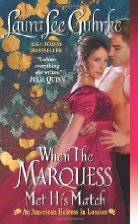 Lady Belinda Featherstone is a matchmaker; having made a very successful match herself as an American heiress to a British nobleman, she now guides young American heiresses on the social niceties of British society. In short, she teaches them how to make a catch, never mind the fact that her marriage wasn’t a grand success, because she’s determined to marry them off to nice men who will treat them properly. But when Nicholas, Marquess of Trubridge asks her help in finding an American heiress, Belinda is less than keen to help. Nicholas is exactly the kind of man she’d warn her heiresses off. So she sets him up with the most boring possible women, not only because he’s dangerous, but because she might just want him for herself. Lady Belinda Featherstone is a matchmaker; having made a very successful match herself as an American heiress to a British nobleman, she now guides young American heiresses on the social niceties of British society. In short, she teaches them how to make a catch, never mind the fact that her marriage wasn’t a grand success, because she’s determined to marry them off to nice men who will treat them properly. But when Nicholas, Marquess of Trubridge asks her help in finding an American heiress, Belinda is less than keen to help. Nicholas is exactly the kind of man she’d warn her heiresses off. So she sets him up with the most boring possible women, not only because he’s dangerous, but because she might just want him for herself.
I was pleasantly surprised when I first encountered Laura Lee Guhrke a couple of years ago; it’s been a while since she last released a book, but I’ve been catching up on the Girl Bachelor series in the background (typically, not reviewing them at all except for a mini review). I’ve really enjoyed every single book I’ve read by her and When The Marquess Met His Match was no exception to that rule.
One of the things I have enjoyed about the books I’ve read by Guhrke so far is the masterful way she builds the relationship between the characters. Neither Belinda nor Nicholas is precisely ready for their relationship to happen. Belinda has been so scarred by essentially being told she wasn’t wanted by her husband, with whom she’d fallen in love, that she can’t imagine herself ever feeling for a man who might treat her the same way. Similarly, Nicholas doesn’t really want to marry but desperately needs the money, and the last thing he wants is to fall for the matchmaker who apparently doesn’t have much money at all. Because of their misconceptions about one another, they struggle with their attraction, but eventually work it out for themselves. It all works so well and the couple’s interactions genuinely sparkle each and every time.
It’s also very amusing how Belinda works hard to put Nicholas off, particularly at the beginning when she’s determined to set him up with all of the least attractive women available. The balance between humor and more serious, romance-y scenes works really well here, and lightens the book rather than bogging it down with the baggage that both characters have.
A very satisfying read, and well worth it for romance fans in particular. Laura Lee Guhrke is becoming an auto-buy for me (and a very exciting find on Edelweiss in this case). Fortunately, I still have a considerable amount of backlog to get through before I have to wait anxiously for new releases!
All external book links are affiliate links. I received this book for free for review.
 Good afternoon Saloners! I am currently facing the (first world) dilemma that I suspect all book lovers must face eventually – is there such a thing as too many books? Good afternoon Saloners! I am currently facing the (first world) dilemma that I suspect all book lovers must face eventually – is there such a thing as too many books?
In my case, unfortunately, the answer to that question is yes.
I have four bookcases in my house, two large normal Ikea Billy style bookcases and two smaller ones, maybe about half that size. And they are all officially full of books. I definitely have a book acquisition problem. I have nearly 600 unread books (although fortunately about 100 of those are ebooks) and while a good portion of those are still living in my parents’ house in the United States, most of them seem to be living here in a house that is too small for them. My husband is patient and tolerant, far more than I am, but now the books have colonized the floor in front of the bookcases, and for him this is enough. So, I’m officially on a physical book buying ban, and I must read physical books rather than ebooks. I mean, I can read ebooks, but it means I have to wait even longer before acquiring new physical books. And, well, I like physical books.
Plus, I’m going on holiday next month, and I should probably think about saving money for that rather than buying books all the time.
So! The rules of the ban are as follows:
- No new physical books until after my birthday (January 12th), unless I can clear the floor and some shelf space first.
- Pre-ordered books are okay, if they were pre-ordered before today.
- Ebooks under £2 are also okay. They don’t take up any space and I’ve taken positive chances on a lot of books this way, then gone on to buy plenty of that author’s books (Jo Walton, perfect example) at normal prices.
Although I only decided on the ban a few days ago, I’m already wishing for various books, not helped by the fact that I like to spend time in my local Waterstone’s …
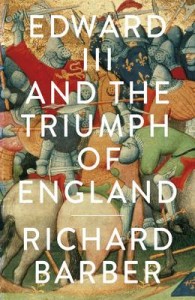 Edward III and the Triumph of England in particular is calling my name – very, very loudly. I mean, how am I supposed to resist a book that is essentially about medieval chivalry, one of my very favourite subjects in the world? With difficulty, I think. The book focuses on the career of Edward III and his court after the victory at Crecy. This is already on my Christmas wish list. It’s also an absolutely beautiful book that would fit right in with my small but growing collection of history. Richard Barber wrote or contributed to a couple of books I used for my MA dissertation (which was actually on chivalry but at a slightly later date) so this is guaranteed to be fascinating for me. Edward III and the Triumph of England in particular is calling my name – very, very loudly. I mean, how am I supposed to resist a book that is essentially about medieval chivalry, one of my very favourite subjects in the world? With difficulty, I think. The book focuses on the career of Edward III and his court after the victory at Crecy. This is already on my Christmas wish list. It’s also an absolutely beautiful book that would fit right in with my small but growing collection of history. Richard Barber wrote or contributed to a couple of books I used for my MA dissertation (which was actually on chivalry but at a slightly later date) so this is guaranteed to be fascinating for me.
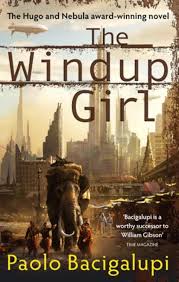
The Windup Girl caught my eye in the bookstore yesterday. The summary from Amazon:
Anderson Lake is a company man, AgriGen’s calorie representative in Thailand. Under cover as a factory manager, he combs Bangkok’s street markets in search of foodstuffs long thought to be extinct. There he meets the windup girl – the beautiful and enigmatic Emiko – now abandoned to the slums. She is one of the New People, bred to suit the whims of the rich. Engineered as slaves, soldiers and toys, they are the new underclass in a chilling near future where oil has run out, calorie companies dominate nations and bio-engineered plagues run rampant across the globe.
And as Lake becomes increasingly obsessed with Emiko, conspiracies breed in the heat and political tensions threaten to spiral out of control. Businessmen and ministry officials, wealthy foreigners and landless refugees all have their own agendas. But no one anticipates the devastating influence of the Windup Girl.
It just sounds exactly like the kind of science fiction that I’m into right now and it went straight on the wishlist.
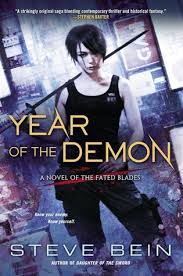
I loved – and I mean really, really loved – Steve Bein’s first book in this series, Daughter of the Sword. I was thrilled to learn that the second book was releasing sooner than I’d hoped, but it looks like I’ll have to wait a little bit longer to get my hands on this.
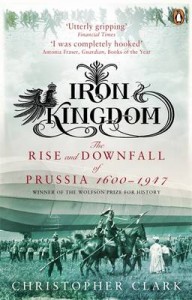
Iron Kingdom was one of the books referenced in Vanished Kingdoms. I feel like I don’t know nearly enough about Prussia to properly understand more recent European history and that recommendation sealed the deal for me. I really want to add this to the aforementioned slowly-growing collection of history. It’s sitting on my wishlist, waiting for that time when I’ve cleared off shelf space.
What are you wishing for? Have you run out of shelf space yet?
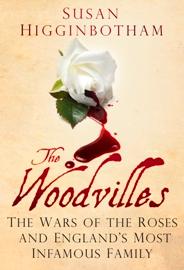 Today I’m thrilled to welcome Susan Higginbotham, author of such fantastic historical novels as The Traitor’s Wife and Hugh and Bess, with a guest post to celebrate the release of her first published non-fiction work! The Woodvilles is out now in the UK and on Kindle in the US; in the meantime enjoy Susan’s post below on the death of Edward Woodville. Today I’m thrilled to welcome Susan Higginbotham, author of such fantastic historical novels as The Traitor’s Wife and Hugh and Bess, with a guest post to celebrate the release of her first published non-fiction work! The Woodvilles is out now in the UK and on Kindle in the US; in the meantime enjoy Susan’s post below on the death of Edward Woodville.
In April 1488, Edward Woodville, the youngest brother of Elizabeth Woodville and one of the men who had shared in Henry Tudor’s victory at Bosworth three years before, was awarded the Order of the Garter. He did not enjoy it long, because on July 28 of that same year, he fell in battle attempting to aid Francis, the Duke of Brittany.
The duke, who had offered succor and support to Henry Tudor as well as to Edward Woodville during their exile, was threatened with a French invasion. Edward longed to help his old friend. As Polydore Vergil tells it:
Edward Woodville, a stout and courageous man . . . either to avoid the tedium of peace or moved by his love of the duke, earnestly beseeched King Henry that by his permission he might go to Britanny with some band of soldiers to aid his friends. And, lest the King of France could reproach Henry for this, he said he would go secretly with no supplies, which would give a show of unfeigned flight. The king, who hoped that a peace would be arranged by his ambassadors, was so far from indulging Edward’s ardor that he strictly forbade him to undertake any scheme of the kind, thinking it foreign to his dignity to offend Charles, to whom he hoped to ingratiate himself in a matter of little importance which he thought would do nothing to aid the Duke of Britanny. But Edward, when the king had forbidden him to do as he wished, decided to act without his knowledge, and quickly and secretly went to the Isle of Wight, of which he was lieutenant. And from there, having gathered a band of soldiers to the number of approximately four hundred, he crossed over to Britanny and joined with them against the French.
King Charles of France instructed his commander, General de la Trémoille, on 5 July 1488 to “make war as vigorously as you can,” an order which the general followed with enthusiasm. On 28 July, Duke Francis, after meeting with a council of war that included Edward, determined to go to the relief of Fougères and St Aubin, both under siege. Although it turned out to be too late to save the fortresses, which had surrendered, the Bretons determined, as reported by Molinet, “to engage the French . . . as best they could.”
The Marshal de Rieux was in overall command of the Breton forces, Trémoille in charge of the French. To fool the French into believing that there were a large number of English troops, the Breton army dressed 1,700 Bretons in surcoats bearing the red cross of St George, like the men of Edward’s forces.
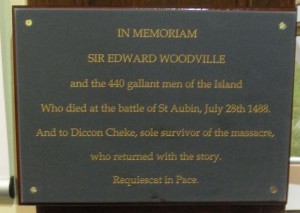 Plaque on Isle of Wight commemorating Edward Woodville.
Photograph courtesy of author Dorothy Davies”? Thanks! As reported by Edmund Hall:
When both the armies were approaching to the other, the ordinance shot so terribly and with such a violence, that it sore damaged and encumbered both the parties. When the shot was finished, both the vanguards joined together with such a force that it was marvell[ous] to behold. The Englishmen shot so fast, that the Frenchmen in the forward, were fain to recule to the battle where their horsemen were. The rearward of the Frenchmen, seeing this first discomfiture began to flee, but the captains retired their men together again, & the horsemen set fiercely on the Bretons, and slew the most part of the footmen. When the forward of the Bretons perceived that their horsemen nor the Almaines carne not forward they provided for themselves & fled, some here, and some there, where they thought to have refuge or succour. So that in conclusion the Frenchmen obtained the victory, & slew all such as wore red crosses, supposing them all to be Englishmen. In this conflict were slain almost all the Englishmen, & six thousand Bretons, Amongst whom were found dead the lord Woodville . . .
Legend has it that only one of the men who had left with Edward returned to the Isle of Wight: a page named Diccon Cheke.
When the Knights of the Garter met again in 1489, they would hold a requiem mass and offer the swords, helms, and crests of two fallen knights, one of whom was Edward. It was left for the heralds to write his epitaph: “a noble and courageous knight” who bravely fought and died for a cause not his own.
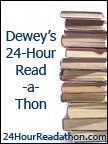
Happy #readathon day!
I am a big fan of the Read-a-thon; there is little I enjoy more than a solid block of 24 hours that I’m allowed to spend just reading. Doesn’t happen often enough in my view! And at a time when my blogging motivation is probably at an all-time low, perhaps the Read-a-thon is just the way to get things kicked off to a more interesting place and feel like I’m part of the community again. Worth a try, anyway!
The little badge to the left of these words links to the website where you can learn more about the ‘thon itself and Dewey, its founder, who we all remember fondly as one of the cornerstones of our community originally.
So what do I have on my pile to read today? I think I’ve assembled one of my largest Read-a-thon piles ever. If anything this probably just shows how many books I have around that I’m seriously looking forward to. I’ve tried to keep it to a mix of fantasy, a bit of historical fiction, some easy and short non-fiction, and then some rare YA for me. All books that I want to read immediately, but that are also fairly quick and probably more attention-grabbing.
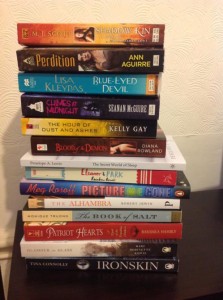
I think I’m going to start with Eleanor & Park or Picture Me Gone. Ironskin is also really high up on the list. I’m hoping to get through 3-4 books before the end tomorrow at 1 pm my time!
Are you joining in this time around? What are you reading?
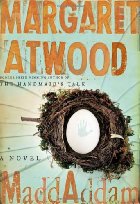 If you haven’t read Oryx and Crake or The Year of the Flood, you should do so before reading this book, or this little review, as it may contain spoilers. If you haven’t read Oryx and Crake or The Year of the Flood, you should do so before reading this book, or this little review, as it may contain spoilers.
A small group of humans and “Crakers”, genetically modified humanoid beings created by Crake, have survived the devastating plague that has wiped out much of humanity. This book picks up right where The Year of the Flood left off and deftly weaves together the stories from those two books into one cohesive, fascinating whole.
I didn’t read Oryx and Crake when it first came out; I actually only read it because I got The Year of the Flood as a review copy. But I’ve been entranced throughout by the way that Atwood has constructed this particular post-apocalyptic world. I admired the world-building in the first book and the characterization of the second; MaddAddam combines these two aspects. These few remaining people are creating a new reality and new myths to support that reality. The past is important, but which elements of the past get remembered? It’s a key question in this novel as we watch what the characters to do to pass on those myths to future generations.
I’d highly recommend all three of these books; I actually suspect they’d be best read together in one go, which I didn’t manage to do. But however you read them, make sure you don’t miss this excellent trilogy.
All external links are affiliate links. I received this book for free for review.
|
|




 Giving up blogging has been an educational experience. I’ve been writing in this blog regularly for at least six years, and the last more-than-three-weeks is the longest period I’ve ever gone without writing a post. I fully intend to return to blogging because, oddly enough, I find that I miss it. I’m also craving writing something – anything – that isn’t my fledgling novel at the moment, so I thought I’d share a few observations.
Giving up blogging has been an educational experience. I’ve been writing in this blog regularly for at least six years, and the last more-than-three-weeks is the longest period I’ve ever gone without writing a post. I fully intend to return to blogging because, oddly enough, I find that I miss it. I’m also craving writing something – anything – that isn’t my fledgling novel at the moment, so I thought I’d share a few observations.

 As his brutish father’s only hope for an heir, Hugh Prentice has not had an easy time of it, and when he got drunk and shot his best friend, his life got considerably worse. Now a cripple, he’s finally managed to get his father’s heavy hand away from
As his brutish father’s only hope for an heir, Hugh Prentice has not had an easy time of it, and when he got drunk and shot his best friend, his life got considerably worse. Now a cripple, he’s finally managed to get his father’s heavy hand away from  When Juliet Montague’s husband George leaves her, she’s trapped in a cycle of Jewish not-quite-widowhood. She can’t divorce him without his presence, as under Jewish law the man must divorce his wife, but until he dies, assuming she knows about it, she can’t marry or really even look at another Jewish man. In the conservative Jewish community of her parents, she’s just not treated in the same way as other women, made worse by the fact that she’s spent seven years as a single mother putting practicalities ahead of her artistic nature. When she turns thirty and goes out to buy a refrigerator, which she’s dutifully saved towards, she is instead captivated by an artist on the street who asks to paint her picture for the same cost. Juliet falls into a world of artists in 1960’s London, enriching her life immeasurably.
When Juliet Montague’s husband George leaves her, she’s trapped in a cycle of Jewish not-quite-widowhood. She can’t divorce him without his presence, as under Jewish law the man must divorce his wife, but until he dies, assuming she knows about it, she can’t marry or really even look at another Jewish man. In the conservative Jewish community of her parents, she’s just not treated in the same way as other women, made worse by the fact that she’s spent seven years as a single mother putting practicalities ahead of her artistic nature. When she turns thirty and goes out to buy a refrigerator, which she’s dutifully saved towards, she is instead captivated by an artist on the street who asks to paint her picture for the same cost. Juliet falls into a world of artists in 1960’s London, enriching her life immeasurably. Lady Belinda Featherstone is a matchmaker; having made a very successful match herself as an American heiress to a British nobleman, she now guides young American heiresses on the social niceties of British society. In short, she teaches them how to make a catch, never mind the fact that her marriage wasn’t a grand success, because she’s determined to marry them off to nice men who will treat them properly. But when Nicholas, Marquess of Trubridge asks her help in finding an American heiress, Belinda is less than keen to help. Nicholas is exactly the kind of man she’d warn her heiresses off. So she sets him up with the most boring possible women, not only because he’s dangerous, but because she might just want him for herself.
Lady Belinda Featherstone is a matchmaker; having made a very successful match herself as an American heiress to a British nobleman, she now guides young American heiresses on the social niceties of British society. In short, she teaches them how to make a catch, never mind the fact that her marriage wasn’t a grand success, because she’s determined to marry them off to nice men who will treat them properly. But when Nicholas, Marquess of Trubridge asks her help in finding an American heiress, Belinda is less than keen to help. Nicholas is exactly the kind of man she’d warn her heiresses off. So she sets him up with the most boring possible women, not only because he’s dangerous, but because she might just want him for herself. Edward III and the Triumph of England in particular is calling my name – very, very loudly. I mean, how am I supposed to resist a book that is essentially about medieval chivalry, one of my very favourite subjects in the world? With difficulty, I think. The book focuses on the career of Edward III and his court after the victory at Crecy. This is already on my Christmas wish list. It’s also an absolutely beautiful book that would fit right in with my small but growing collection of history. Richard Barber wrote or contributed to a couple of books I used for my MA dissertation (which was actually on chivalry but at a slightly later date) so this is guaranteed to be fascinating for me.
Edward III and the Triumph of England in particular is calling my name – very, very loudly. I mean, how am I supposed to resist a book that is essentially about medieval chivalry, one of my very favourite subjects in the world? With difficulty, I think. The book focuses on the career of Edward III and his court after the victory at Crecy. This is already on my Christmas wish list. It’s also an absolutely beautiful book that would fit right in with my small but growing collection of history. Richard Barber wrote or contributed to a couple of books I used for my MA dissertation (which was actually on chivalry but at a slightly later date) so this is guaranteed to be fascinating for me.


 Today I’m thrilled to welcome Susan Higginbotham, author of such fantastic historical novels as
Today I’m thrilled to welcome Susan Higginbotham, author of such fantastic historical novels as 


 If you haven’t read
If you haven’t read 






Recent Comments